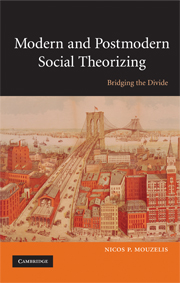Book contents
- Frontmatter
- Contents
- List of figures
- Acknowledgements
- Introduction
- Part I The theoretical background: the development of the agency–structure problematic
- Part II Parsonian and post-Parsonian developments
- Part III Agency and structure: reworking some basic conceptual tools
- Part IV Bridges between modern and late/postmodern theorizing
- Part V Towards a non-essentialist holism
- 13 Grand narratives: contextless and context-sensitive theories
- 14 The actor–structure dimension: anti-conflationist holism
- 15 The micro–macro dimension: anti-essentialist holism
- 16 The inter-institutional dimension: beyond economism and culturalism
- Instead of Conclusion: Twelve rules for the construction of an open-ended holistic paradigm
- Appendix: In defence of ‘grand’ historical sociology
- References
- Index
13 - Grand narratives: contextless and context-sensitive theories
Published online by Cambridge University Press: 05 June 2012
- Frontmatter
- Contents
- List of figures
- Acknowledgements
- Introduction
- Part I The theoretical background: the development of the agency–structure problematic
- Part II Parsonian and post-Parsonian developments
- Part III Agency and structure: reworking some basic conceptual tools
- Part IV Bridges between modern and late/postmodern theorizing
- Part V Towards a non-essentialist holism
- 13 Grand narratives: contextless and context-sensitive theories
- 14 The actor–structure dimension: anti-conflationist holism
- 15 The micro–macro dimension: anti-essentialist holism
- 16 The inter-institutional dimension: beyond economism and culturalism
- Instead of Conclusion: Twelve rules for the construction of an open-ended holistic paradigm
- Appendix: In defence of ‘grand’ historical sociology
- References
- Index
Summary
In this and the following chapters (14–16) I take an intermediate, ‘bridging’ position between conventional, holistically oriented macro-sociological theories and postmodern approaches which reject all holistic theories and conceptual frameworks as always entailing essentialist connotations. It is worth emphasizing once more that the notion of holism in this and the following chapters is not used in a way which entails the ‘methodological individualism versus collectivism’ debate; nor does it raise the ontological issues of the emergence and the reality of causal powers of social structures (as in chapter 7). Rather than focusing on philosophical issues, it simply raises the methodological question of whether or not it is possible to study social wholes (such as formal organizations, communities, nation-states and global formations) in a non-essentialist and, at the same time, non-fragmentary, overall manner.
Postmodern, anti-foundationalist discourses have developed two major criticisms of holistic theories. If a distinction is made between substantive theories and conceptual frameworks, the first critique stresses the over-ambitious and often deterministic character of the former, whereas the second critique points to the essentialist connotations of the latter.
‘Grand narratives’: context-sensitive and insensitive
In this case the postmodern attack concentrates on positivistically oriented theories aimed at producing generalizations or ‘laws’ that are supposed to be universally valid in all social situations regardless of time or space. The critics point out that such transhistorical, transcultural generalizations, whether they focus on the structure of kinship, the dynamics of revolutionary movements or the nature of religious phenomena, are wrong and, in addition, their pseudo-scientific pretensions lead (as in the case of ‘scientific’ Marxism) to all sorts of authoritarian practices (Lyotard, 1974).
- Type
- Chapter
- Information
- Modern and Postmodern Social TheorizingBridging the Divide, pp. 217 - 224Publisher: Cambridge University PressPrint publication year: 2008

